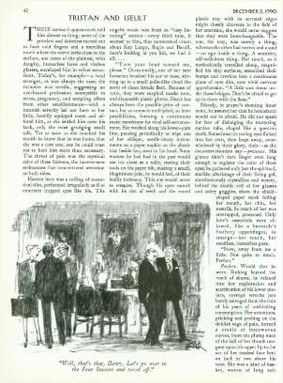Juan Manuel Camacho Ramos, of the Universidad de Alcalá, wrote an essay on “Tristan and Iseult,” an Updike short story that was published first in The New Yorker and later in his collection The Afterlife and Other Stories. “‘Tristan and Iseult’: John Updike’s Medieval Method or an Ancient Mirror for Modern Man” was recently made available online. Here is the link and the abstract:
“Updike began to explore the Tristan legend after reading Denis de Rougemont’s books Love in the Western World and Love Declared which he examined exhaustively in the early 1960s and, although he did not wholly agree with the entire content of Denis De Rougemont’s thoughts, it left a very deep impression on him. Consequently, Updike uses the story of Tristan and Iseult in three novels and several of his short stories mostly to deal with the issue of conjugal infidelity and to present the traditional themes of the legend like self-affirmation, social marginalization, indecision, despair, sexuality, life, and death in contemporary settings. In both his novels and short stories, Updike tries to modernize the legend dissecting marital conflict and generally showing adultery as the escape valve which will lead the lovers to the paradoxical world of unreal freedom where the mixture of intense passion and pain will finally threaten the family and the social order of the protagonists just like in the Tristan romances of old.”
Curiously, as Ramos noted, “The couple in this adaptation of the Tristan legend have nothing but a dental appointment in common. There is, moreover, no other objective explanation for Tristan’s attraction to Iseult apart from her motherly skills of caring for him and making him feel as if at home. . . . Magic is present in Updike’s ‘Tristan and Iseult’ to the extent that Tristan numbs his mind through fantasy creating a world where he can evade reality and live a dream. In ‘Tristan and Iseult’ Updike turns a dental appointment into a modernized medieval romance that happens solely in Tristan’s imagination. It contains a pathetic undertone that accompanies the story and is highlighted to the extent that Tristan is unaware of his own guile and Iseult remains ignorant of any event save her duty to remove the rot from her client’s mouth.”

